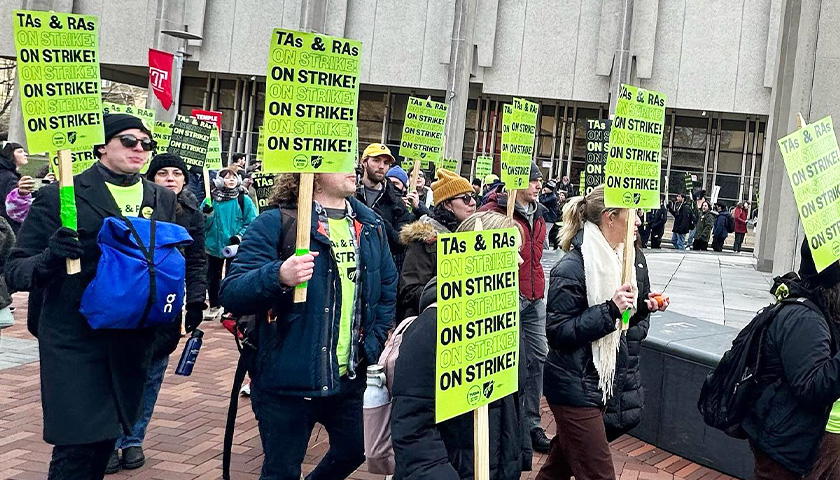by Alexa Schwerha
Temple University (TU) cut health care benefits and tuition remission for graduate students currently on strike, the Philadelphia Inquirer reported.
Graduate students began their strike for higher wages, improved health care, extended leave and better working conditions on Jan. 31. TU informed students via emails, which were shared on Twitter by affected students, that the university would no longer pay part of or all tuition costs and strikers would lose health care benefits because of their participation in the strike.
“We believe that this is retaliation for going on strike and we are pursuing a challenge to it,” Bethany Kosmicki, past Temple University Graduate Student Association (TUGSA) president, contract negotiations team member and research assistant, told the Daily Caller News Foundation. “We are deeply disappointed that the university has made this decision because this is a choice for them to cut benefits and from our understanding it is unprecedented in the history of grad labor movement.”
 Striking students must pay the full balance of their tuition by March 9, according to a screenshot of the email posted to Twitter by student Madison Ingram. Students who do not meet the deadline will be charged a $100 late fee and be barred from registering for classes until the amount is paid.
Striking students must pay the full balance of their tuition by March 9, according to a screenshot of the email posted to Twitter by student Madison Ingram. Students who do not meet the deadline will be charged a $100 late fee and be barred from registering for classes until the amount is paid.
The students demanded a base-wage increase to $32,800 to meet the cost of living in Philadelphia, according to the TUGSA website. The university offered 3% raises for the three remaining contract years, according to the TU website, but argues that it also provides $20,000 in education in addition to salary.
TU also cut access to strikers’ health coverage because of their participation in the strike, an email shared on Twitter by Max Engleman confirmed. The university warned that strikers would “not be paid,” “lose tuition remission” and “no longer receive paid health benefit coverage” on its website.
“It seems that your coverage was terminated due to your decision to strike,” the email reads.
Strikers demand their health care plan extend to dependents. Graduate student workers are currently eligible for full coverage without monthly contribution, according to the TU website.
“Temple University values all the contributions its employees make to the community. We recognize that the university can only fulfill its mission with everyone doing their part,” Deirdre Childress Hopkin, TU senior director of communications, told the DCNF. “At the same time, the university cannot make concessions that would be economically unreasonable. On the contrary, Temple has settled contracts with two bargaining units in the past six months representing thousands of workers without controversy and through communication and engagement with those bargaining units.”
The strike represents 20% of TUGSA members, according to a Feb. 8 announcement sent by TU to students. The announcement advised students against participating in an upcoming walkout to support the strike, saying that “striking TUGSA members have no authority to cancel classes or make any promises regarding your attendance, grades or any other matter related to courses they are no longer teaching.”
“The university is refusing to bargain unless the union … makes significant cuts to our proposals, and conveniently the lead negotiator for Temple will be going on a two-week vacation starting today,” Kosmicki told the DCNF. “We are ready to negotiate a fair contract at any time, and we hope that the university understands that it needs to do the right thing and meet us at the table.”
Hopkin told the DCNF that “TUGSA has not given its members a chance to vote on the university’s offer even though a significant majority of their members are rejecting the strike and choosing to report to work.”
“TUGSA members who want to return to work and get their benefits restored can do so immediately. They should contact their school/college to confirm their return to work and restore their benefits,” Hopkin said. “Returning to work does not mean individuals cannot picket or voice their concerns. It just means they must work to earn compensation and benefits, like anyone else.”
Ingram did not immediately respond to the Daily Caller News Foundation’s request for comment. Engleman could not be reached for comment.
– – –
Alexa Schwerha is a reporter at Daily Caller News Foundation.
Photo “Temple University Strike” by Monica Robinson.








